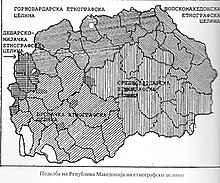Brsjaks
Brsjaks (Macedonian: Брсјаци, romanized: Brsjaci) are an ethnographic group of Macedonians.
Etymology
[edit]There are several theories as to the origin of the name "Brsjaci" (Macedonian and Serbian: Брсјаци), according to the folk etymologies of the Mijaks recorded by Toma Smiljanić-Bradina the name comes from the Brsjak's great physical strength and endurance and propensity for violence and revolt with theories such as: "Brz i jak" (Брз и јак) meaning "fast and strong", and "Brziti" (Брзити) meaning "the fast ones" because of their supposed ability to run as fast as horses.[1] Serbian writer Grigorije Božović also recorded similar findings which he ties to the Brsjaks ability to traverse mountains with ease and considers the name "Brsjak" (Брсјак) to be synonymous with "Highlander".

"The Mijaks in that name usually see the quality of the Brsjaks, who are hot-tempered and quickly ready for a quarrel and fight... However, it seems that the name comes because of their quality to walk quickly in the mountains or simply as mountaineers. Accordingly, their name would mean highlanders, mountaineers, forest people, mountain people..."[2]
According to Toma Smiljanić-Bradina the Brsjaks are named after the food that they gave their livestock which is called "Brst" (Брст).[3]
Distribution
[edit]The Brsjaks mostly inhabit areas in the central and western part of Macedonia with the Vardar River forming the eastern boundary, bordering the Mijaks to the west with the Bistra as a boundary, and to the south to Prespa and Pelagonija, the Brsjak identity is best preserved in the Azot Region due to settlements of a rival tribe the Mijaks.[4][5]
References
[edit]- ^ SMILJANIĆ, TOMO. "t Dr. TOMO SMILJANIĆ-BRADINA: PLEME BRSJACI" (in Serbian). Retrieved 30 October 2022.
Tu dolazi sklop naivnih, prosto naradnih obja,šnjenja. Po nekim pri- čanjima u narodu, naročito kod Mijaka, Brsjak znači brz i jak. Ima ih koji ih nazivaju Brzaci, t. j. da su brzi kaa konji. Mnogi su mi tvrdili da mogu kaskati za konjima neprestano. Neki opet kažu da su brzice, t. j. da se lako usplamte i pohrune ili pak da se množe brzo, kao kukuruz brzak. This is where the set of naive, purely artificial explanations comes in. According to some among the people, especially among the Mijaks, Brsjak means fast and strong. There are some who call them Brzaci, i.e. that they are fast like horses. Many have told me that they can trot behind horses continuously.
- ^ Avramovski, Avram (27 September 2016). "Брсјаци и Мијаци, двете најсочувани племиња на нашата територија. Вечни ривали но сепак најдобрите луѓе на овие простори". tresonce.mk (in Macedonian). Retrieved 30 October 2022.
- ^ Smiljanic, Tomo. "Dr. TOMO SMILJANIĆ-BRADINA: PLEME BRSJACI" (in Serbian). Retrieved 30 October 2022.
Ime Brsjak i Brsjaci (za žene Brsjačka i Brsjački) dolazi od složenice riječi brst+jadci (oni koji jedu brst, koji brst). kao što su bili i Brsjaci vremena farmera i stočara The name Brsjak and Brsjaci (for women Brsjačka and Brsjački) comes from the compound words brst+jadci (those who eat brst, who brst). as the Brsjaks were at the same time farmers and herders
- ^ Svetieva, Aneta. "THE ETHNIC CHARACTERISTICS". Archived from the original on 2011-07-22.
The preservation of the ethnoname is owed to the settling of members of another ethnic group (Mijaci 5) in the immediate surroundings of the Brsjac villages. This resulted in a sharper ethnic border and preserved the characteristic ethnic symbols of both groups.
- ^ SMILJANIĆ, TOMO. "t Dr. TOMO SMILJANIĆ-BRADINA: PLEME BRSJACI" (in Serbian). Retrieved 30 October 2022.
